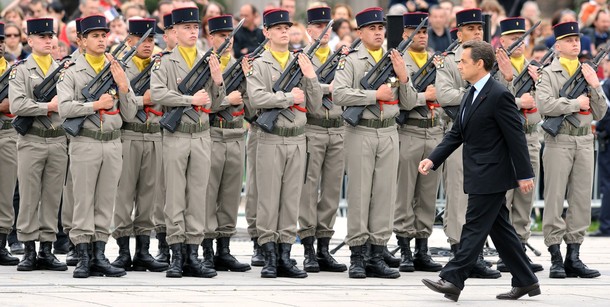
From Nathalie Nougayrède, Le Monde/Worldcrunch: This is his war. Nicolas Sarkozy wants to know every detail of every battle. He learned the names of the districts of Libyan cities that the rebels still had to capture. He studied the maps of the roads that access Tripoli. He was fascinated by this military operation, which he initiated. He followed the topography of the Brega and Misrata front lines, the heart of a revolutionary fight of which he declared himself to be the spokesman.
He was the one to take the decisions on the deliveries of weapons to the rebels and even appealed to the good offices of his key ally, Qatar. Those weapons included French weaponry destined to the Nafusa Mountains in June; and others, recently delivered, to a rebel group that landed on a beach in Tripoli after having left from Misrata. . . .
Nicolas Sarkozy threw himself in this Libyan adventure like few other Western leaders have before him on a post-Cold War international crisis. Surely, he saw in this rebellion a possible political comeback, and beyond that, the desire to see France renew its strategic position in the Arab world. For him, it’s a way to return to the themes of his 2007 election when he had promised that France “would be side by side with the oppressed.”
Last August 12, on the Charles-de-Gaulle aircraft carrier, the president alluded strongly to the “constant commitment of France (…) in every place where the freedom of the people and democracy are threatened.” In private, when talking about Gaddafi, he even used such phrases as: “We are going to make him bite the dust” or “we’re going to bring him to his knees.”
The war in Libya would thus be a path to recover some stature for Sarkozy. Rebellions in Tunisia and Egypt had plunged French diplomacy into disarray, particularly after the absurd offers made to the Tunisian dictator Ben Ali to send police forces to help him.
When referring to the situation in Libya, Sarkozy often alluded to what happened in Srebrenica, where Europe’s worst massacre since World War II took place in 1995. Last June, in Brussels, he barked back at reporters’ questions about the risks of the Libyan campaign. “Today, Benghazi, a city of 1 million people, would be wiped off the map (…) In Srebrenica, 8,000 people should have been protected by the democracies!”
Read the original story in French. (photo: Getty) (via Real Clear World)
Image: getty%206%2025%2010%20%20Nicolas%20Sarkozy%20Colmar%20ceremony.jpg
